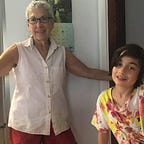Dealing With Loss
This is number 11 in the series Vision: A Journey
The Losses Begin
First, in the summer of 2004, I lost my little island of central vision. Then I lost my father. He had a massive heart attack in August, 2004. It happened so quickly we were not able to see him nor say goodbye. I was not feeling very warm or loving towards him at the time, so his sudden death brought up many strong emotions.
The next year, in May of 2005, Michael was diagnosed with cancer. He had surgery followed by weeks of radiation, which caused several uncomfortable side effects. I felt that I had lost my strong, healthy, athletic husband of 25 years. I often felt annoyed at his requests for help and comfort and I would sometimes respond with anger. While it is hard to admit, I think at the time I felt (irrationally) angry with him for getting cancer.
Our 25th wedding anniversary came and went, as neither of us felt like celebrating. The good news is that by the end of the next year, Michael was back to full health and activity, side effects gone. And we celebrated our 25th anniversary a year later with a festive dinner at a historic restaurant in Paris.
But back to the summer of 2005. Once again, I had to cancel a much- anticipated trip. This one was to New Zealand with my colleague and dear friend and research partner, Bob. I was looking forward to co-chairing our SRTL research gathering at the University of Auckland. Before the meeting, Bob and I were to spend a few days in Tahiti, and then travel with my co-chair, Dani, to the North Island of New Zealand. We had excitedly planned our trip and all our hotels, rental car, and flights had been booked. This time, my eyes were not the cause of the trip cancellation. I needed to stay with Michael as he recovered from surgery and radiation treatments.
An Unexpected Award
Because of Michael’s treatments, I would have also cancelled my annual trip to the Joint Statistics meetings, which were always held in early August. However, this year, for the first time the conference would take place in Minneapolis. I was glad to be able to attend some sessions, but was going to skip the big awards ceremony, which was held at night. To my surprise, Michael encouraged me to attend the ceremony because my friend Beth would be made a Fellow that night, and he thought I should be there to support her. Michael even offered to attend with me. This seemed unwise because he was scheduled to receive a radiation treatment that day which usually left him fatigued.
The afternoon of the ceremony, while I was at the convention center, Michael called and told me some unexpected good news: his treatment that day had been cancelled due to an equipment malfunction. He was feeling good and was on his way to meet me. We sat together at the awards ceremony, and all of a sudden, I heard my name being called. I was being given the Founder’s award, the highest honor for service to the American Statistical Association. I was stunned. Michael walked with me to the stairs and I walked up onto the stage. I received a gift and plaque from the current president, the renowned statistician Brad Efron. Due to my vision disability, the executive director was there to guide me back down the stairs. I felt dazed and quite overcome, as I learned that my friend Chris had nominated me with support from many of my colleagues. After all I had been through, and how hard I had been working, this recognition felt wonderful and validating.
The winner of the Founder’s award was never disclosed in advance (although Michael had been alerted). If the conference had not been in Minneapolis, I would have missed yet another award from my professional organization, as I did when I became a Fellow in 2002 and missed that ceremony in Atlanta due to my eye surgery. This year, there was a festive party afterwards, organized by some of my friends, and for a while, the summer sadness and feelings of loss disappeared.
Another Loss
In the fall of 2005, my daughter Rebecca left home to start a new life in Portland, Oregon. She had graduated from college and had chosen this city as the place to embark on the next phase of her life. Harder than the miles that would separate us was the realization that she was separating from me psychologically. She seemed to constantly question and disapprove of me, espousing her new views of feminism, class, and materialism. My darling daughter, with whom I had been so close for almost 23 years, was now cutting the apron strings, and I could not bear to let go.
As a result of all these losses, I found myself tearing up with sadness almost daily. My spirits had tumbled. I was trying to keep up my heavy work schedule, nurture Michael, and grieve my father’s death and Rebecca’s impending departure. At some point my wise daughter recommended that I see a therapist.
Next post: Therapy
